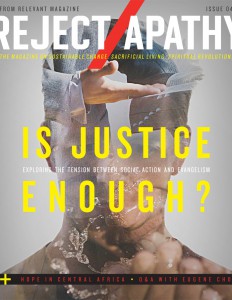 In the recent issue of Reject Apathy, an off-shoot publication of RELEVANT Magazine, Tim Hoiland explores what he believes to be a tension between “serving justice” and “saving souls”:
In the recent issue of Reject Apathy, an off-shoot publication of RELEVANT Magazine, Tim Hoiland explores what he believes to be a tension between “serving justice” and “saving souls”:
This [young] generation’s passion for justice is, without doubt, something to celebrate. It’s a breathtaking sign that the Spirit is at work, leading young men and women into lives marked by the reigning belief that all of life matters to God, not just the parts we might call “spiritual.”
But in this sincere step toward activism, have other essential aspects of the Christian calling been neglected? As Christians respond to the cries of the oppressed, have they failed to share the life-giving message that is truly good news to the poor?
… If Christians are to bridge the artificial divide between evangelism and social action, they must immerse themselves in the Bible’s story of redemption. They must learn from those who have gone before them. And they must see the strength of the diversity of the Church—a company of uniquely called individuals in God’s cosmic mission.
As Hoiland goes on to remind us, pointing to the work of sociologist Rodney Stark, the church has successfully fused evangelism and social action throughout its history, from the selling and sharing of possessions in the Book of Acts to the church’s widespread establishment of schools, orphanages, and hospitals in more recent centuries (a feature highlighted at length in Rev. Sirico’s recent book).
But in the early 20th century, Hoiland believes, something changed:
While missionaries with this holistic approach have continued to serve in far-flung corners of the world, an unfortunate rift occurred in the American Church beginning in the 1920s. Christians created a fault line and took sides—some advocating the “social Gospel,” with its civic and political implications, and others holding fast to the “fundamentals” of faith, with its emphasis on personal sin and salvation. While both camps could provide biblical support for their stance, both lacked essential aspects of the Church’s mission in their reactionary defense.
This rift remained for decades, with deep-seated suspicion on both sides preventing any real effort to find common ground, much less recover a truly holistic understanding of God’s mission.
This is certainly a generalization, as many Christians have continued to fuse these features, despite some broader factional trends. Regardless, Hoiland’s call serves as a helpful reminder that we needn’t be confined to neat, isolated categories of “justice” and “evangelism,” and should instead always be pushing toward a more diverse community of believers wherein each individual is uniquely contributing to the common good through his or her own individual gifts and callings:
To repair such a rift requires a joint effort. God has not called His people to seek justice or do evangelism in a vacuum. He has called them to participate in His holistic mission where they are, in a particular time and place. And through His provision of the local Church, He has ensured they won’t navigate this pursuit alone.
If this generation’s passion for justice is to be sustained, Christians need to link arms—and learn from—brothers and sisters in Christ who lean alternately toward social action and evangelism. Instead of advocating a homogenous community, Christians ought to feel comfortable making the most of their shared strengths in their diversity of age, race, nationality, giftedness, personality and calling.
God’s mission has never been one-dimensional but rather multifaceted—flowing the full range between words and action, evangelism and justice, truth and service. Scripture teaches it, history confirms it and the body of Christ requires it to carry out its mission effectively.
Success in this not only requires an integrated approach to word and deed, but also a fully orbed view of the areas that we as individuals are called to impact. The project of integrating evangelism and justice more thoughtfully need not be confined to the walls of the church or the mission statements of missional non-profits. Each and every day, in our families, communities, and vocations, we have an opportunity to fuse these components as we live out our individual callings and seek to transform the broader culture for the glory of God.
Read the full article here.
To join the On Call in Culture community, like us on Facebook or follow us on Twitter.
For more on this subject, read Duane Litfin’s recent book, Word versus Deed: Resetting the Scales to a Biblical Balance, on which I’ve written previously.

